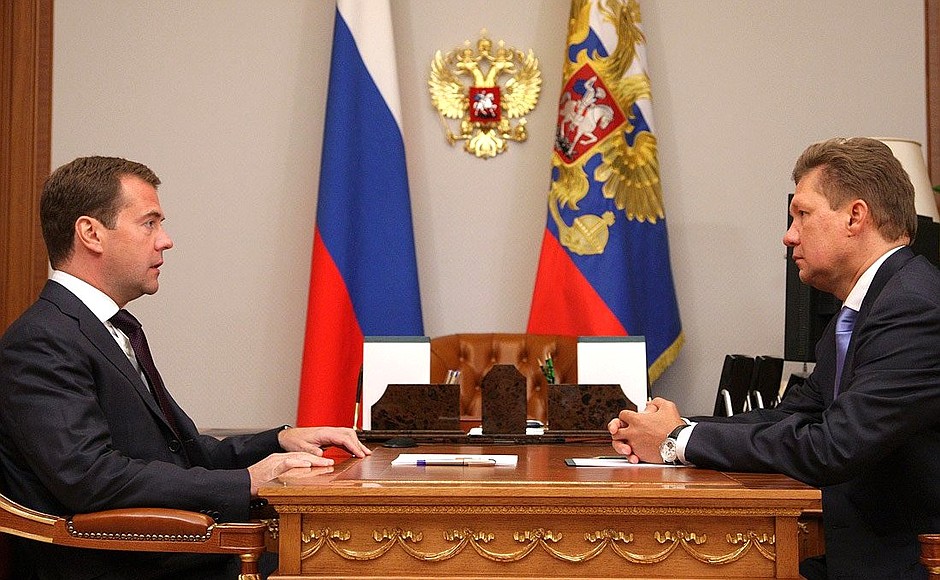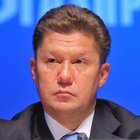
Mr Miller said that by 2014, most social facilities in Kamchatka would be connected to the gas network.
Gazprom has as well launched an initiative to help those affected by the wildfires, and is pursuing a number of social programmes too, on which Mr Miller also updated the President. They include the Gazprom to Children programme, under which the company will build 678 sports facilities in various regions around the country.
* * *
President OF RUSSIA DMITRY MEDVEDEV: Mr Miller, let’s begin by looking at a few topics to discuss for a start.
First of all, one of the big issues we have been working on for some time now is the project to connect Kamchatka Territory to the gas supply network and build a mainline gas pipeline to Petropavlovsk-Kamchatsky. How is this work going? Where are you now with it?
chairman of Gazprom Management Commettee Alexei Miller: Mr President, in accordance with the instructions you and the Government issued, we have undertaken efforts to connect towns and settlements in Kamchatka to the gas supply network. This work began in 2007, and we are now completing construction of the mainline gas pipeline from Sobolevo to Petropavlovsk-Kamchatsky. This is a key component in the work to get the whole region connected. The pipeline will come on line in September, in just a few weeks’ time. The first site to be connected will be Steam Power Plant-2.
Getting connected to the gas supply network is unquestionably extremely important socially for the entire region because it will make it possible in the future to renounce deliveries of other energy resources currently supplied to Kamchatka and avoid the problem of interruptions in the deliveries. This will give the region much more reliable and stable energy and heating supplies.
The gas pipeline is 392 kilometres long, and we will use it to deliver around 750 million cubic metres of gas a year to consumers in Kamchatka. Steam Power Plant-2 will be the first facility connected to the supply network. Over several years, in accordance with the programme that we have drawn up together with the region’s authorities, we will connect new facilities to the network, including social sector facilities. The work is to be funded by the regional authorities from the local budget. Housing and utilities sector facilities will also gradually be connected to the network. By 2014, the gas supply network will be solidly and lastingly established throughout the region.
Dmitry Medvedev: Very good. This is a long-awaited event and we will be looking forward to the completion of works. You said the project was decided in 2007?
Alexei MILLER: Yes, in 2007, the Government gave the instruction, and over these last three years a lot of work has been done to develop the infrastructure for the gas supply network and build the mainline pipeline. We have been working very intensively. I can say this with justification because before we began our project another company was in charge of this work and, unfortunately, very little had been accomplished over quite some years.
Dmitry Medvedev: I remember this story. I was, if you recall, Chairman of the Gazprom Board of Directors at that time, and I remember the discussions on this matter.
Good. Moving onwards, I have another question, one related to the abnormal weather we have had of late, especially in central Russia and the Volga regions. Gazprom is our biggest energy company, and so I’d like to hear how these conditions have affected your work. Have you had any problems at all?
Alexei Miller: The heatwave did have an impact on Gazprom’s operation as gas consumption at electricity production facilities rose in July and August.
Dmitry Medvedev: By how much?
Alexei Miller: By 5 percent. That was the growth in gas consumption at power generating facilities. The heatwave meant that whoever could was switching on cooling systems, fans and air conditioners, and so the electricity production facilities needed more gas, and we increased our supplies to them accordingly.
But talking about the trends on the Russian market as a whole at the moment, the determining factor in the rising domestic gas consumption is not the heatwave but economic growth.
If we compare Gazprom’s supply volumes over the same periods in 2010 and 2009, we see that supplies to the domestic market are up by 14 billion cubic metres compared to the same period last year. We are seeing an increase in all the economic sectors that are our main engines of growth: power generation, the metals production, and the agrochemical and cement industries. There has also been some increase in the housing and utilities sector, and some growth in household gas consumption.
We can say, therefore, that Gazprom is supplying in full the amounts of gas the domestic market needs, and we have had good results, record results, so far this year.
Dmitry Medvedev: This is good as a sign of economic recovery, and of course it also gives Gazprom new possibilities for development and for increasing gas supplies. Good.
Is there anything else, Mr Miller?
Alexei Miller: Mr President, when you were Chairman of the Gazprom Board of Directors the company launched a number of programmes, including social programmes such as Gazprom to Children. I want to inform you that by the end of this year we will have built a total of 678 sports facilities as part of this programme. This includes football fields, swimming pools, and multipurpose sports centres. More than 200,000 children are now playing sport at the facilities built as part of the Gazprom to Children programme.
By the start of the new school year [on September 1] we will have completed construction of a new multipurpose sports centre in the city of Bugulma (Republic of Tatarstan). You gave the instruction for this centre’s construction in the winter of 2008, after four children died in a tragic incident on a railway embankment there. I can report now that your instruction has been carried out and this multipurpose sports centre in Bugulma has been built and will soon be able to receive more than 1,000 children every day for practicing sports.
Dmitry Medvedev: This is very good news.
We also need to be thinking now about how to help our people who have lost property because of the wildfires. I met recently with private sector business leaders. Of course, the state authorities bear the main responsibility for paying compensation for lost homes and property. But of course, traditionally, in such situations, the entire community steps in to help out. You could think, perhaps, about what contribution Gazprom could make.
Alexei MILLER: Mr President, Gazprom is a company with a diverse portfolio of business activities that includes media companies too. We had the idea of giving the people who lost their homes in the fires a free set of equipment for receiving the NTV-Plus satellite channel package and providing them with a free package of 36 channels.
Dmitry Medvedev: This would be good, after all, far from all of them had satellite TV before the fires, and given that these people have a lot on their minds right now, this would probably be a useful thing.
<…>
